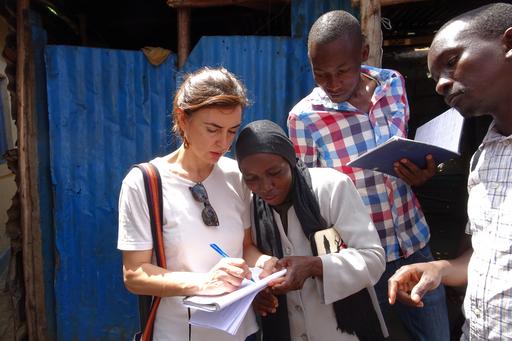- Home
- News and events
- Find news
- How women lost their livelihoods when a Kenyan fish market was demolished
How women lost their livelihoods when a Kenyan fish market was demolished
Kenyan authorities recently demolished a fish market where hundreds of low-income women make daily a living. The Recycling Networks project with researchers from the University of Gothenburg have produced a short documentary about this event and its the dramatic consequences for these women’s livelihoods.
The fish market in Kisumu is located on the shores of Lake Victoria in Kenya. Decades ago, women started transforming the fish left-overs from the fish factories by the lake into nutritious food products affordable by low-income residents.
Recycling projects
At the same time, the fish market has served as a nursery for other grassroot innovations, such as fish leather production, and different recycling projects.
This innovation is one of the many grassroots practices examined by researchers from the International team Recycling Networks. Maria José Zapata Campos, is project leader, researcher at the Gothenburg Research Institute, and associate professor at the Business Administration Department, at the School of Business, Economics and Law.
The fish market is important in various ways, and has created opportunities for so many people to build a better life.

”It was a member of our local research team, a young waste picker doing some participatory video-taping for us, who identified this exiting and innovative practice. The local team helped collect data, and investigate the work started by women groups, who transform residues from the fishing industry into various products,” she says.
Maria José Zapata Campos describes a grassroots movement that has improved both the environmental sustainability of the city as well as the economic inclusion of poor women themselves.
”The fish market is important in various ways, and has created opportunities for so many people to build a better life.”
Bulldozers demolished the place
Despite these contributions, Kenyan authorities decided to demolish the fish market earlier this year and without previous notice. The Recycling Networks team has quickly produced a short documentary about this event and the dramatic consequences for these women’s livelihoods.
Now the fish market is destroyed. On January 8th, bulldozers rolled into the area and demolished all the fish stalls, with furnishings and tools inside. According to Maria José Zapata Campos this happened without any immediate warning:
”The women came in the morning to continue with their usual duties, only to discover that the whole area had been destroyed.”
The demolition of the fish market is one more of the many violent evictions resulting from recent upgrading programs to ‘modernize’ the city, while preparations are underway for the International event Africities Summit, which will be held in Kisumu in 2022.
”Because of that, various projects are now underway in Kisumu to make the city appear more beautiful and modern. Unfortunately, this development has also led to a situation where thousands of people are being evicted from various places in the city without warning and without being offered an alternative to continue doing what they do to earn a living.”
The demolition of the fish market is one more of the many violent evictions resulting from recent upgrading programs to ‘modernize’ the city
To raise attention around the issue, as well as continue with the research, Recycling Networks has now produced the short documentary ”The Demolition of Women's Livelihoods” where producer and filmmaker John Chweya has interviewed some of the affected women.
”This is an attempt to create awareness about the issue that has had such great consequences for hundreds of women in a very vulnerable situation,” says Maria José Zapata Campos.
”In this case, just conducting research as usual, is not an option. This is an action-research and we are committed with the environmental and economic inclusion of these communities”. The researchers will also continue examining how these urban upgrading programs and top-down policy making affect grassroots movements and their environmental work. These demolitions and evictions already have deep and serious consequences in very vulnerable communities, says Maria José Zapata Campos.
”One of the women in the video says that she has lost everything. She talks about her cooking utensils and oil. And that is how it is. That was all she owned. So she has really lost everything she had to provide tomorrow’s meal for her family”

